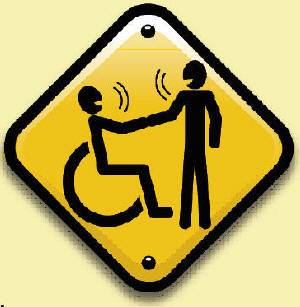Christian Living: Making Friends With the Disabled
 We all have things we want to say and ideas we’d like to share, and we love it when someone listens to us.
We all have things we want to say and ideas we’d like to share, and we love it when someone listens to us.
With that in mind, I’d like to help you meet some new acquaintances—people who are all around you, but whom you may have been overlooking. They are the deaf, the blind, people with speech problems, those confined to a wheelchair or disabled in some other way. Most of us are always polite to disabled people, but we may be reluctant or fearful to take the time to really talk to them.
Disabled people are often starved for conversation. Behind their disabilities are interesting personalities with valuable experiences to share. But many of them are trapped behind the social barriers that we unconsciously tend to erect around them. I want to encourage you to break down those barriers, to learn to talk—really talk—with people who are in some way disabled. You may find it a little awkward at first, but I promise you it is worth the effort to get past the initial reservation.
Here are some tips to help you get started:
· When having a conversation with a deaf person who uses sign language, remember that they “hear” you by watching their interpreter. It is tempting to talk back to the interpreter. Don’t do this. Talk directly to the deaf person even though he or she is not looking at you.
· Don’t feel you have to “dumb things down.” Sign language is a very sophisticated form of communication and it is possible to communicate everything you want to say. Relax and let the interpreter convey your meaning.
· If there is no interpreter, use a pen and paper. This might seem laborious, but it can be a lot of fun. Just relax and be patient.
· If the deaf person can lipread, speak clearly and make sure they can see your lips move. You’d be surprised how often we obscure their view with gestures in the course of a normal conversation.
· Don’t let a wheelchair get between you and a new friend. But remember it is tiring for them to have to look up all the time. Pull up a chair or sit on a nearby step so you can be on the same eye level. (Have you ever noticed that children often feel quite natural talking to people in wheelchairs?)
· Most blind people can hear perfectly well. So there is no need to speak loudly or v‑e‑r‑y d‑i‑s‑t‑i‑n‑c‑t‑l‑y to them.
· Don’t pet a guide dog. It has a job to do.
· It can be difficult communicating with people who have speech impediments (like stammering). But remember—they have dealt with this for years. They don’t mind being asked to repeat themselves. Again, be patient. Don’t be too quick to give up on a conversation. They are pleased that someone is interested, and you may help them develop more confidence in their ability to express themselves. Their feelings of self-worth will grow.
Lawrence Siegel, Founder and Director of the National Deaf Education Project, states, “The need and right to communicate is the most fundamental of human rights. To foster communication is to reveal all the possibilities of life.”
Remember—people with disabilities are only disabled—not unable. Most people with disabilities are quite capable of—and want to—carry on a normal conversation with you. So why not gather up your nerve, think of a good conversation starter and approach the next blind, deaf or otherwise disabled person with a smile? It could change both your lives.
April Hottle, a NAD III, EIPA 4.2 certified interpreter, has worked in the mainstream elementary, middle and high school settings since 1994 . She is the wife of Scott Hottle, who is both a mainstream Deaf and Hard of Hearing teacher and an ASL Instructor on the college level. She has two children: a daughter, Laken, who is 15, and a son, Luke, who is 12. Both Scott and Luke are deaf.
Author: April Hottle

